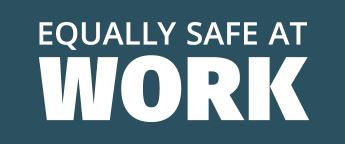Published Date: Oct 13th, 2022
The Chief Executive and Leader of Fife Council are pleased to confirm that the Kingdom’s largest employer is participating in the Equally Safe at Work accreditation programme, as part of a wider strategy to make communities safer for women and girls.
Council Leader, Cllr David Ross said: “We’re committed to addressing gender equality, which is directly linked to the often-hidden issue of violence against women. This is a problem that needs to be tackled throughout our society, but employers can start by addressing workplace inequality.
“The council is a key member of the Fife Violence Against Women Partnership, which works to the national ‘Equally Safe’ strategy in our communities. It leads on prevention and awareness raising, addressing inequalities, ensuring provision of services for all those who need them, and holding perpetrators to account.
“So, within our own organisation we’ve committed to the Equally Safe at Work programme to help us establish positive cultural norms and ensure all employees feel safe and supported at work. It provides the tools to progress this agenda and make meaningful change for all our staff, which aligns with our wider aim to build safer communities across Fife.”
Chief Executive, Steve Grimmond continued: “I want the council to be a great place for anyone to work.
“Last year we refreshed our gender-based violence policy. And, as part of our journey to accreditation, we’ll be updating and developing other employment policies.
“We’ll do more to raise awareness of gender equality and violence against women and work to address occupational gender segregation - challenging gender stereotyping, for example, where roles are seen as traditionally male or female.
“We’ve already had a good response to a staff survey, which will help us understand how people feel currently, and whether our actions make a difference. We’ll keep reviewing perceptions of equality as part of our workplace culture, to make sure we’re creating lasting change and meeting people’s ongoing needs.”
The phrase violence against women (sometimes VAW) describes a wide range of abusive, coercive and violent behaviours where the greatest risk factor is being female. These include:
- domestic abuse
- sexual violence - including harassment, sexual assault and rape, and child sexual abuse
- commercial sexual exploitation
- child sexual exploitation
- so called ‘honour based’ violence, including female genital mutilation and forced marriage
Sheila Noble is the Fife Violence Against Women Partnership Coordinator and she’s pleased to see the council setting this example.
“Violence against women and girls has no place in Fife in 2022,” she said, “I hope other employers will look at the work Fife Council is doing to put a spotlight on the issue of gender inequality, and consider ways to do the same.
“Of course, while women and girls are at greatest risk of gender based violence, we know that boys, men and trans[1]people are also affected – and we all need to work together to eradicate it.
“There’s support available in the community for anyone, of any gender, affected by violence and abuse. Look under health and social care on the fife.gov.uk website for information and resources.”


